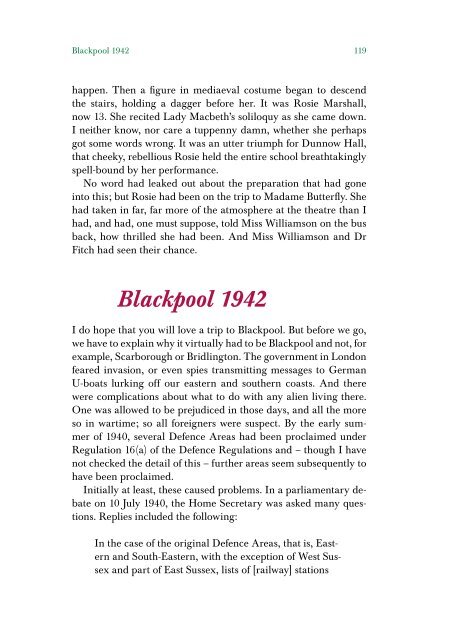Roger Atkinson - Blackout, Austerity and Pride
Blackout, Austerity and Pride – Life in the 1940s is a book written primarily from actual experience. It tells how an alert and intelligent boy, effectively orphaned at the age of 13, sets out to gain a foothold in life. Aided by some resourceful women, he unites a thirst for knowledge with a growing passion for places and buses and a strong sense of duty. http://www.memoir1940s.org.uk/
Blackout, Austerity and Pride – Life in the 1940s is a book written primarily from actual experience. It tells how an alert and intelligent boy, effectively orphaned at the age of 13, sets out to gain a foothold in life. Aided by some resourceful women, he unites a thirst for knowledge with a growing passion for places and buses and a strong sense of duty.
http://www.memoir1940s.org.uk/
You also want an ePaper? Increase the reach of your titles
YUMPU automatically turns print PDFs into web optimized ePapers that Google loves.
Blackpool 1942<br />
119<br />
happen. Then a figure in mediaeval costume began to descend<br />
the stairs, holding a dagger before her. It was Rosie Marshall,<br />
now 13. She recited Lady Macbeth’s soliloquy as she came down.<br />
I neither know, nor care a tuppenny damn, whether she perhaps<br />
got some words wrong. It was an utter triumph for Dunnow Hall,<br />
that cheeky, rebellious Rosie held the entire school breathtakingly<br />
spell-bound by her performance.<br />
No word had leaked out about the preparation that had gone<br />
into this; but Rosie had been on the trip to Madame Butterfly. She<br />
had taken in far, far more of the atmosphere at the theatre than I<br />
had, <strong>and</strong> had, one must suppose, told Miss Williamson on the bus<br />
back, how thrilled she had been. And Miss Williamson <strong>and</strong> Dr<br />
Fitch had seen their chance.<br />
Blackpool 1942<br />
I do hope that you will love a trip to Blackpool. But before we go,<br />
we have to explain why it virtually had to be Blackpool <strong>and</strong> not, for<br />
example, Scarborough or Bridlington. The government in London<br />
feared invasion, or even spies transmitting messages to German<br />
U-boats lurking off our eastern <strong>and</strong> southern coasts. And there<br />
were complications about what to do with any alien living there.<br />
One was allowed to be prejudiced in those days, <strong>and</strong> all the more<br />
so in wartime; so all foreigners were suspect. By the early summer<br />
of 1940, several Defence Areas had been proclaimed under<br />
Regulation 16(a) of the Defence Regulations <strong>and</strong> – though I have<br />
not checked the detail of this – further areas seem subsequently to<br />
have been proclaimed.<br />
Initially at least, these caused problems. In a parliamentary debate<br />
on 10 July 1940, the Home Secretary was asked many questions.<br />
Replies included the following:<br />
In the case of the original Defence Areas, that is, Eastern<br />
<strong>and</strong> South-Eastern, with the exception of West Sussex<br />
<strong>and</strong> part of East Sussex, lists of [railway] stations


















